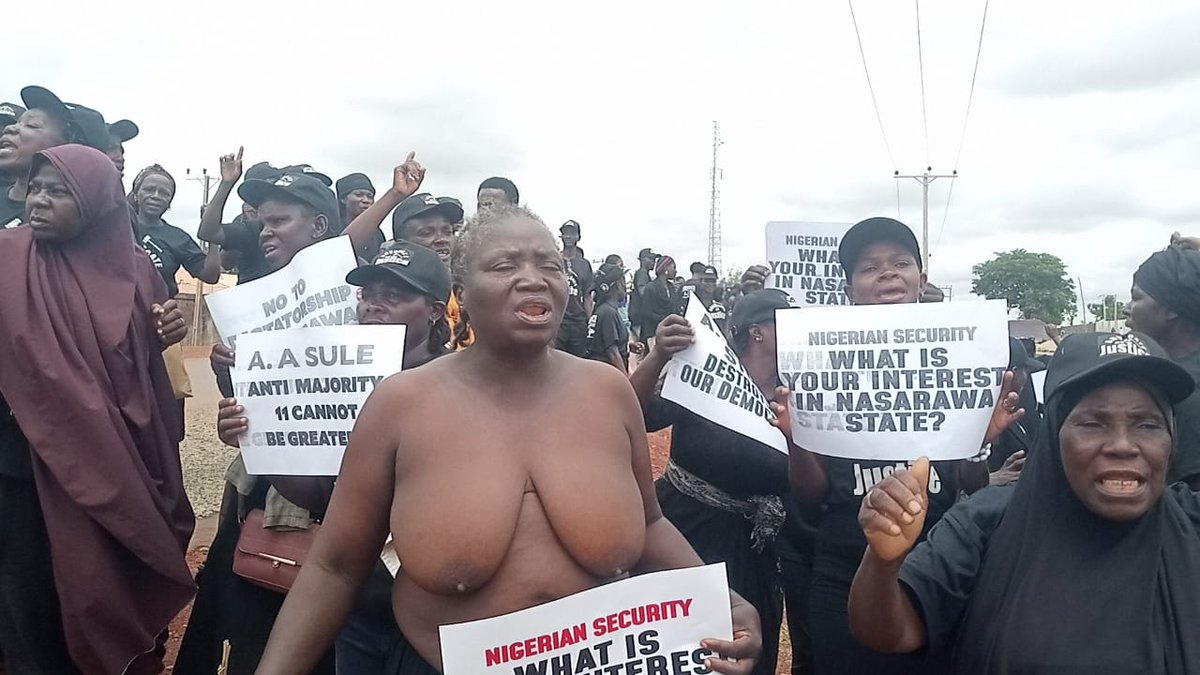- Shedding layers to expose a state in crisis
From Abel Leonard, Lafia
In a dramatic display of defiance and desperation, women in Nasarawa State took to the streets yesterday shedding their clothes to protest against the political injustice plaguing the leadership tussle of the state House of Assembly leadership.
The demonstrations by the women in the state were a result of alleged controversial governorship elections and the ongoing turmoil surrounding the leadership of the state House of Assembly. As the scorching sun beat down upon the protesters, their bare bodies stood as a striking symbol of their frustration and determination.
Recall that the state Assembly recently has been under serious controversies as two individuals had emerged as speakers of the house with Hon. Daniel Oga Ogazi as the speaker of the G13 faction while the Hon. Ibrahim Balarabe Abdullahi is the speaker of the G11.
The Ibrahim Balarabe Abdullahi-led faction was sworn in by the acting Clark of the state House of Assembly who administered the Oath and proclamation sent by the governor, Abdullahi Sule to inaugurate members of the 7th assembly but was carried out at another venue instead of the Assembly complex while the other faction which produces Daniel Oga Ogazi was sworn in by a deputy Clark alleged to be of level 8.
The recent governorship election in Nasarawa State had been marred by allegations of voter suppression, rigging, and a lack of transparency. Citizens, already disillusioned with a political system riddled with corruption, witnessed their hopes for change dashed once again.
The aftermath of the elections saw the emergence of a new governor, whose victory was widely disputed. The state House of Assembly, responsible for upholding democratic principles and addressing grievances, became embroiled in a contentious battle over its leadership, further deepening the crisis.
In response to this tumultuous political climate, a group of Nasarawa women resolved to take an unconventional path to raise awareness and demand justice. Clad in nothing but their skin, they assembled at the heart of the state capital, Lafia, and at the gate of the state Assembly, Shandam Road with the intent of stripping away the layers of deceit that had concealed the truth.
The decision to go nude was not taken lightly, but it was born out of a belief that their bodies would serve as a potent weapon against the political establishment, grabbing attention and forcing people to confront the gravity of the situation.
The women, encompassing various age groups and backgrounds, marched through the city, their unwavering determination inspiring both awe and discomfort among onlookers. The spectacle evoked a mix of emotions – shock, admiration, and a profound sense of solidarity with their cause. Their bodies, no longer shrouded by clothing, were emblems of vulnerability and strength, challenging societal norms and demanding justice.
While critics dismissed the protest as a mere spectacle, an attention-grabbing stunt, the women vehemently defended their actions, asserting that their nakedness symbolized the vulnerability of the people in the face of political manipulation and betrayal. They argued that they had resorted to such a drastic measure because their voices had been consistently ignored and their pleas for change had fallen on deaf ears.
“We are laying ourselves bare, both physically and emotionally, to expose the rot that has infected our state,” exclaimed Fatima Ahmed, one of the protest organizers. “We refuse to be silenced any longer. Our nakedness is a cry for justice, a plea for the world to see the extent of our suffering and the urgency of our cause.”
The women’s protest has ignited a fierce debate across the country, with opinions sharply divided. Some view the demonstration as an act of bravery, highlighting the lengths people are willing to go to fight for justice. Others argue that it trivializes the gravity of the issues at hand, reducing a serious political crisis to a mere spectacle.
In response to the public outcry, Nasarawa State Governor, Abdullahi Sule finally addressed the issue during a press conference held at the Government House. The governor acknowledged the concerns raised by the protesters but urged the aged women to stop exposing their bodies and seek justice appropriately. For it is not good for a state like Nassarawa.
Adding that the election has come and gone it is time to start rebuilding while encouraging stakeholders to come together to develop Nassarawa state.
The nakedness protest had undeniably exposed the deep-seated divisions within the assembly, with several members accused of colluding with political forces to subvert the will of the people.
Beyond the immediate political sphere, civil society organizations and human rights activists rallied behind the Nasarawa women, lending their voices to the demand for justice. Protests, demonstrations, and town hall meetings sprouted across the state, creating a groundswell of support for the cause.
The nascent movement, sparked by the nakedness protest, has now transformed into a broader platform for societal change. Community dialogues, workshops, and awareness campaigns have been organized to empower citizens and educate them about their rights and the importance of active participation in the democratic process. Grassroots organizations have emerged, aiming to monitor and hold public officials accountable for their actions.
As the dust settles, it is evident that the Nasarawa women’s nakedness protest, initially debated as a mere spectacle, has become a catalyst for genuine reform. The courage and resilience displayed by these women have ignited a spark that has permeated every corner of the state.
While the road to meaningful change remains long and arduous, the seeds of transformation have been sown, and the people of Nasarawa would need to stand united in their demand for a more just and equitable society.

